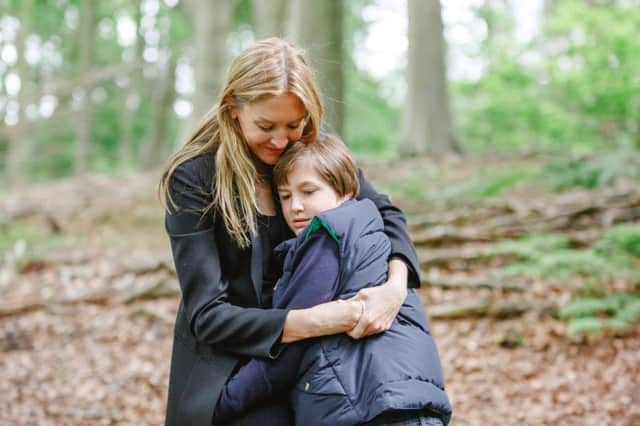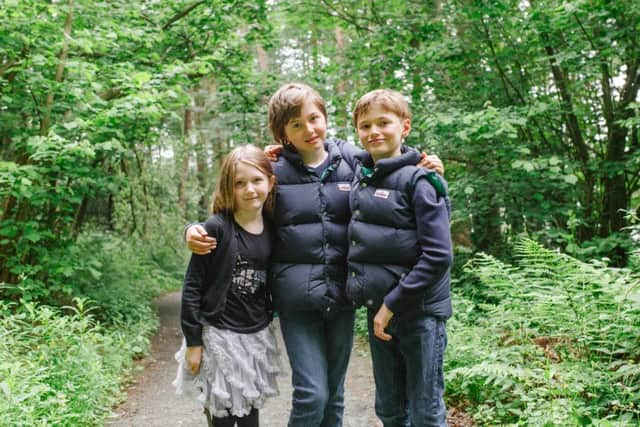'˜When they told me my son would never love me I felt my heart break' says mum of autistic boy


With the flashing fairy lights, baubles, gifts and festive crowds. Santa’s grottos are a seasonal favourite for families across the UK. But not all children are able to enjoy them.
For thousands of children in Britain diagnosed with autism, the trip to see Father Christmas can be a frightening mix of huge crowds and loud noises. But rather than just avoid it, mum of three Lynn Westerman Holt decided to do something about it.
Advertisement
Hide AdAdvertisement
Hide AdLynn’s eldest son Alexander, now 12, has autism and she is determined that he should have the same opportunities as other children.


“I knew that simple adaptations to queueing, light and sound levels and preparing him in advance for what to expect would make it more accessible and, more importantly, actually enjoyable for him,” explains Lynn. “Once Stockeld Park and I had agreed the necessary changes, my own and other families were then able to experience some of the wonder and magic of Christmas – for the very first time for many of us – so it meant the world.
“Christmas is all about families spending quality time creating happy memories, so it was important for me personally that I tried to create an inclusive grotto session which we could all enjoy together – it would not be the same to take Alexander’s siblings separately, or to have to take all three children home early if he couldn’t cope.”
Lynn now wants to see the work she started at Stockeld Park, the visitor attraction near Wetherby, adopted throughout wider society in a bid to give autistic children the same opportunities as other children.
Advertisement
Hide AdAdvertisement
Hide Ad“There is no way you would be able to discriminate against people with other conditions and disabilities in the way society discriminates against people with autism, even unintentionally,” she says.


“It shouldn’t just be about being aware of people with autism, it is about accepting them and helping them to fulfil their full potential, which at the moment we are just not doing. Why is it always the child with autism that has to do all the work? We are the neurotypical adults and yet we expect these children to fit into our world, which they find extremely hard. We need to meet them at least halfway.”
Alexander was diagnosed as being on the autism spectrum just before his third birthday.
“When it is your first child you don’t have much to compare things to and Alexander hit all his early developmental milestones for the first year. He was walking by his first birthday and babbling.” Then suddenly he stopped babbling or responding to his name.
Advertisement
Hide AdAdvertisement
Hide Ad“We thought at first that he may have a hearing problem and took him to the GP and it was found that he needed grommets. You start to relax and think that must have been it, but at the back of your mind you know there is something else going on,” recalls Lynn. Their GP wasn’t entirely happy either and recommended that Alexander be kept under observation and tested for autism. What followed was months of appointments and assessments and meetings while Lynn was trying to hold down a job and then looking after a baby when her second child was born.
“Around the time Ben arrived Alexander became almost catatonic,” recalls Lynn. “He just went into his own world and we couldn’t reach him.”
Alexander’s diagnosis was devastating for Lynn, but the bleak outlook for his future by the professionals was worse.
“It was devastating. They told us that he probably wouldn’t be able to talk, he wouldn’t be able to live independently and he wouldn’t know how to love us. At that moment I physically felt my heart break. All you want as a parent is for your child to have the same opportunities as everyone else and that just wasn’t going to be the case for Alexander. It’s extremely frightening and you grieve for the life you thought your child would have.”
Advertisement
Hide AdAdvertisement
Hide AdLynn says: “Every person with autism is different and even those working in the field don’t always fully understand this really complex condition. It took me a couple of years of trying all sorts of different therapies and trying to make Alexander come over to our world before I questioned why we put all the pressure on people with autism to do all the work. We need to give them the confidence and the skills to come into a world that for them can be terrifying.”
Lynn says her realisation came while watching Alexander play with his brother Ben, 10, and sister Natasha, eight.
“They don’t judge Alexander, they love him for who he is and they will play with him in his world and he will then feel comfortable enough to play with them in theirs. He and Ben have a special bond and it is amazing to see the love between them, especially when we were told he would never know how to love us.”
Alexander doesn’t sleep well and, although through Lynn and Alexander’s hard work he has developed some language, he still struggles to make himself understood a lot of the time.
Advertisement
Hide AdAdvertisement
Hide Ad“Even ordinary situations make him extremely anxious. He quite quickly goes into fight or flight mode. He has a tendency to run off without telling me, especially in places such as supermarkets and that can be very stressful. Or he can react with what people may look at and presume is a tantrum, but it isn’t it is Alexander just not being able to cope. But people just assume he is behaving badly and I am a bad mother which really doesn’t help. It also makes the other children anxious.”
Having a child with autism can be incredibly isolating, says Lynn. Many parents find just leaving the house hard. But she is determined that her children and her own life will not shrink, no matter what the challenge,
“You are constantly on high alert looking for the unkind child who might say something or the situation that could cause a meltdown and Alexander’s siblings are equally as vigilant. But I’m determined he should be allowed to experience life.”
Alexander attends a special school in Bedale, a 90-minute round trip fom his home in Harrogate. “He is a very talented artist and loves comic books and DVDs. But he struggles with the day-to-day challenges of school,” explains Lynn. “He looks forward every year to a two week holiday we have in Majorca. We have to plan that like a military operation. But when he is there he has the most incredible time and he is just like any other funny, loving, relaxed boy. It shows you that in the right environment and with the right support, anything is it possible.”